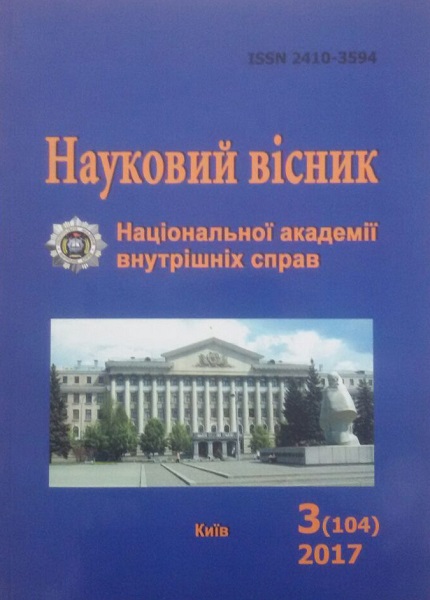Public Calls for Terrorist Acts: Establishment of the Criminal Offence Fact
Abstract
Intensification of terrorist activity in Ukraine is strongly promoted
through controversial calls voiced by politicians, members of illegal
military formations.
Article reveals the ways of proving the pro-terrorist public call
fact occured in the course of pre-trial investigation. Article identifies
types of procedural actions required to be taken to ensure collection
of evidence for manufacturing, storage and distribution along with
making pro-terrorist public calls. Attention is paid to collection of
evidence for public calls distribution in Internet.
Author identifies items and information which can be used as
evidence in criminal proceeding on pro-terrorist public calls: 1) items
containing the abovementioned information (cards, manuscripts,
banners, advertisements, articles, newspapers, etc.); 2) electronic
data (video- and audiomessages posted in Internet and distributed
via TV and radio broadcast, SMS, etc.); 3) items used to produce or
store items or electronic data (computers and accessories,
smartphones, printers, copying machines, videocameras,
USB-sticks, voice recorders); 4) traces left by persons involved in
illegal activity (fingerprints and microtraces found in premises used
for relevant items manufacturing, storage and distribution);
5) witnesses’ statements; 6) examination results; 7) іnformation
contained in videosurveillance equipment installed in premises of
enterprises, organizations and in private residences including car
dash cameras; 8) information traces left during creation and
distribution of works; 9) other information collected in the course of
carrying out (covert) investigative actions.
Downloads
Abstract views: 145 PDF Downloads: 80
- Authors reserve the right to authorship of their own work and transfer to the magazine the right of the first publication of this work under the terms of the Creative Commons Attribution License, which allows other persons to freely distribute published work with mandatory reference to authors of the original work and the first publication of an article in this magazine.
- Authors have the right to enter into separate additional agreements on non-exclusive dissemination of the work in the form in which it was published in the journal (for example, to post an article in the institution's repository or to publish as part of a monograph), provided that the link to the first publication of the work in this journal is maintained.
- The journal's policy allows and encourages the posting of articles by authors on the Internet (for example, in electronic storehouses of institutions or on personal websites), both before the submission of this manuscript to the editorial office and during its editorial processing, as this contributes to the creation of a productive scientific discussion and positively affects the efficiency and dynamics of citing the published work.




